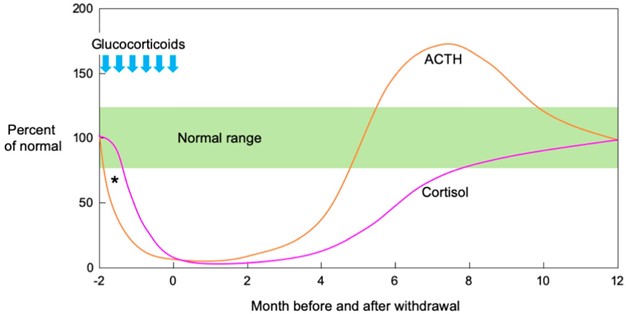A nurse is teaching a client who has been taking prednisone to treat asthma and has a new prescription to discontinue the medication. The nurse should explain to the client to reduce the dose gradually to prevent which of the following adverse effects?
Rebound pulmonary congestion
Hyperglycemia
Adrenocortical insufficiency
Severe dehydration
The Correct Answer is C
Prednisone is a corticosteroid medication commonly used to treat asthma and other inflammatory conditions. When taken for a prolonged period at higher doses, it can suppress the body's natural production of cortisol, a hormone produced by the adrenal glands. Abruptly stopping prednisone after long-term use can lead to adrenocortical insufficiency, also known as adrenal insufficiency or adrenal crisis.
Adrenocortical insufficiency occurs because the body's adrenal glands need time to resume normal cortisol production after being suppressed by prednisone. Gradually reducing the dose of prednisone allows the adrenal glands to gradually increase their cortisol production, minimizing the risk of adrenal insufficiency.
Rebound pulmonary congestion, hyperglycemia, and severe dehydration are not specific adverse effects associated with discontinuing prednisone. However, it is important for clients who have been taking prednisone to follow their healthcare provider's instructions regarding the tapering schedule and any potential risks or side effects.

Nursing Test Bank
Naxlex Comprehensive Predictor Exams
Related Questions
Correct Answer is C
Explanation
Montelukast is a medicine used to treat and prevent asthma and allergic rhinitis. It can cause some side effects, such as stomach pain, headache, cough, or fever. However, some side effects are more serious and need to be reported to the provider.
According to the sources I found, the most serious side effect of montelukast that should be reported to the provider is depression. Depression is a mental health condition that can affect your mood, thoughts, and behavior. It can cause symptoms such as feeling sad, hopeless, or worthless; losing interest in activities you used to enjoy; having trouble sleeping or concentrating; or having thoughts of harming yourself or others.
Montelukast has been linked to neuropsychiatric events, such as agitation, aggression, sleep disturbances, suicidal thoughts and behavior (including suicide). The mechanisms underlying these events are not well understood, but they can occur at any time during treatment. Therefore, patients and caregivers should be alert for changes in behavior or new neuropsychiatric symptoms when taking montelukast. If these occur, they should discontinue montelukast and contact a healthcare provider immediately.
The other options are not listed as serious side effects of montelukast that need to be reported to the provider. Constipation, blurred vision, and palpitations are possible side effects of other medicines used to treat asthma or allergic rhinitis, such as corticosteroids, antihistamines, or beta-agonists. However, they are not specific to montelukast and may not be related to its use.

Correct Answer is D
Explanation
Acetylcysteine has a strong and distinct odor, often described as a sulfur-like smell. It is important for the adolescent to be aware of this characteristic odor so that they do not become alarmed or concerned when they encounter it.
The other options mentioned are incorrect:
A. It is necessary to monitor your serum electrolyte levels: Monitoring serum electrolyte levels is not typically required with oral acetylcysteine therapy. However, it is important to follow the healthcare provider's instructions regarding monitoring and follow-up appointments.
B. "You should avoid eating eggs": There is no specific dietary restriction or need to avoid eating eggs while taking oral acetylcysteine. However, it is always advisable to follow a balanced and healthy diet.
C. "Your mouth will become dry!": Dry mouth is not a common side effect of oral acetylcysteine. Side effects may vary from person to person, but dry mouth is not typically associated with this medication.
Whether you are a student looking to ace your exams or a practicing nurse seeking to enhance your expertise , our nursing education contents will empower you with the confidence and competence to make a difference in the lives of patients and become a respected leader in the healthcare field.
Visit Naxlex, invest in your future and unlock endless possibilities with our unparalleled nursing education contents today
Report Wrong Answer on the Current Question
Do you disagree with the answer? If yes, what is your expected answer? Explain.
Kindly be descriptive with the issue you are facing.
